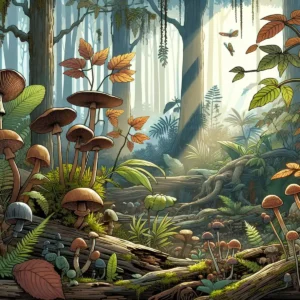
Why are Mushrooms Important to the Food Chain: Fungi Unveiled
Imagine a world without mushrooms, those enigmatic organisms quietly orchestrating life’s continuity from the shadows of the forest floor. Often overlooked, fungi perform indispensable duties that underpin entire ecosystems. Fungi’s pivotal role in the food chain is a tale of unseen influence and ecological necessity. Their place in nature is unique; neither plant nor animal, fungi occupy a kingdom all their own, one that thrives on the very cycle of life and decay. As we delve into the inner workings of ecosystems, the spotlight often misses the quiet contribution of fungi, especially mushrooms, to the intricate web of existence. This insightful article will unveil why mushrooms are vital to the food chain, exploring their roles as decomposers, symbionts, and even producers. Through a journey into organic matter breakdown, symbiotic relationships, and their unexpected nutritional benefits, prepare to discover the world of fungi like never before, illuminating their unheralded yet immense impact on our lives and the planet. The Role of Fungi in the Food Chain Fungi, a kingdom of life distinct from plants and animals, embody a critical role in our ecosystems, markedly impacting the food chain. These organisms are chiefly recognized as nature’s decomposers — they possess the unique ability to break down organic matter that many other organisms can’t. As decomposers, fungi consume dead plants, animals, and other organic material, recycling the nutrients and returning them to the soil. This creates an ongoing supply of critical organic molecules that become the building blocks for new life. Among fungi, mushrooms are particularly noteworthy. Species like the Oyster mushroom not only decompose dead organic materials but can also break down pollutants, thanks to their potent chemical compounds, playing an essential role in detoxifying environments. Furthermore, through symbiotic relationships, such as mycorrhizal associations, fungi are invaluable partners to plants. By extending the root system of their hosts, they enhance water and nutrient uptake, showing that their role extends far beyond decomposition. Without fungi like mushrooms to decompose organic matter, the cycle of nutrients would be halted, stifling the growth of new plants and, by extension, the entire food web aboveground. Their efficient dealing with organic material ensures that primary producers – plants – obtain the necessary nutrients to thrive, supporting primary consumers – herbivores – and secondary consumers – carnivores – and maintaining the delicate balance of our ecosystems. Moreover, mushrooms serve directly as a source of food for various wildlife and even for humans. They are high in dietary fiber, proteins, vitamins, and minerals, making them prized as food and in food supplements. Companies such as Marlow Foods, leveraging the versatile nature of fungi, produce meat alternatives that enhance the food sector, giving insights into the significance and potential of mushrooms that extend beyond their ecological roles. In summary, in the grand tapestry of the food chain, mushrooms and fungi at large are indispensable weavers that render the flow of life possible through their breakdown and creation of organic matter. Understanding the Concept of the Food Chain The food chain concept greatly simplifies the flow of energy and nutrients through an ecosystem. At its base, primary producers like plants harness chemical energy from the sun and convert it into organic compounds in a process called photosynthesis. These primary producers are then consumed by primary consumers – often herbivores – which form the next link in the chain. Secondary consumers, including carnivorous animals, follow by preying on these herbivores. Fungi, which include diverse forms such as yeasts, mushrooms, and molds, fit uniquely in this chain. They are neither plant nor animal and do not photosynthesize. Instead, they acquire chemical energy stored in organic matter through decomposition. Acting as nature’s recyclers, they release organic molecules back into the environment once they have performed their digestive processes externally with enzymes that break down complex organic material. Furthermore, the food chain extends to symbiotic relationships like those seen in lichens. Here, fungi form partnerships with algae, with both parties benefiting mutually; the algae produce food through photosynthesis, while the fungus offers a structure for growth and nutrient absorption. These complex interactions illustrate the intricate web of life, where energy is not merely passed along a linear path but shared among organisms in a dynamic balance. The Unique Position of Fungi in the Food Chain Fungi occupy a unique niche within the food chain; they are neither wholly producers nor consumers. Through processing dead organic material, they generate and recycle essential nutrients, catalyzing energetic flows within ecosystems. This role is not only beneficial but crucial; without fungi, the breakdown of tough substances like cellulose and lignin found in plant cell walls would be significantly impaired. Many fungi enter into mutually beneficial partnerships with plants, exchanging nutrients and supporting the growth of vast networks of plants – an ecological role that defines much of the terrestrial life. These mycorrhizal relationships typify how fungi are entwined with the overall health of ecosystems, facilitating the transfer of nutrients between soil and plants, a critical service for both natural and agricultural landscapes. On the darker side, some fungi can become antagonists in the food chain. Certain species are capable of decimating populations of plants by causing diseases or producing toxic compounds detrimental to both plant and animal life. The duality of fungi highlights their power within the food chain – as sustainers and potential destroyers. Their decomposition action not only fosters soil fertility, propelling the growth of new plant life but also ultimately sustains food for herbivores and all subsequent links in the chain. Beyond their ecological duties, fungi, especially mushrooms, fulfill an essential role in human food systems. They are cultivated globally, adhering to standards regulated by entities such as the Food Standards Agency. Their wide range reflects diversity in both function and nutritional content, solidifying their place not just as decomposers or symbionts, but as a direct and indispensable food source. In essence, the food web would unravel without fungi. The recyclers of nature, the partners of growth, and the providers of sustenance, fungi perform an


